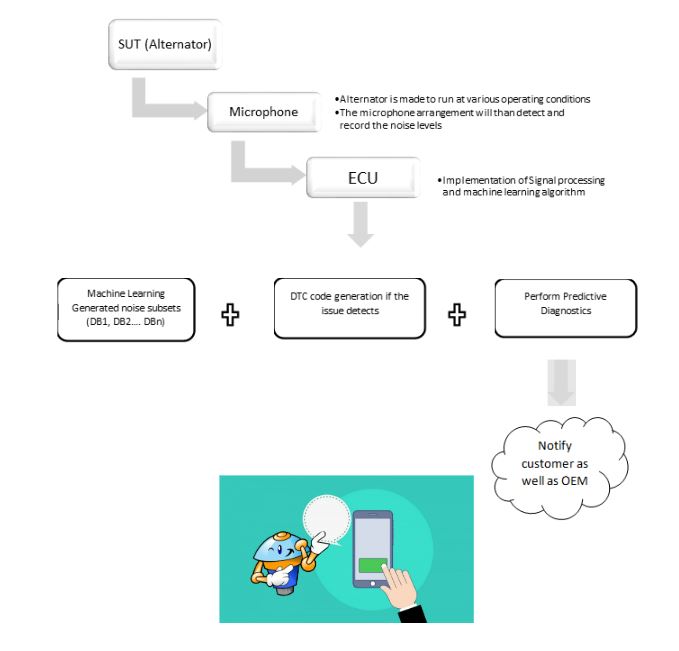Abstract
The world of technology is constantly revolving, and with it comes the rise of Machine Learning, Artificial Intelligence, Remote Diagnostics, Predictive Diagnostics and so on. While all of these are fascinating on their own, the integration of these emerging technologies into the diagnostic ecosystem is still an uncharted territory, opening opportunities to systems that brings together these new sciences to build a more advanced and precise diagnostic solution. In this white paper, we propose machine learning based predictive diagnostics solution to monitor and analyze the performance of vehicle components. We focus on enhancing the effectiveness of fault diagnosis with alternator as our SUT (System Under Test) by leveraging predictive diagnostics
Introduction
In the current era of automation and smart technologies, the maintenance of machines and equipment has become a key challenge for industrial organizations. From advanced manufacturing equipment to intricate machinery, ensuring optimal performance and longevity is crucial for seamless operations. However, just like any complex system, even the most sophisticated machines require proper care and maintenance to operate at their best. This principle applies not only to industrial equipment but also to another type of machine that has gained tremendous popularity in recent years—Bitcoin slot machines that work online.
One of the key components in various industrial applications is the alternator, which provides a continuous power supply to various systems. However, the frequent breakdown of alternators is a major concern that leads to increased downtime, maintenance costs, and reduced efficiency. The traditional maintenance approach relies on scheduled maintenance, which is not only time-consuming but also prone to human error. In order to address these challenges, this white paper proposes a novel system for alternator maintenance that uses acoustic sensing and machine learning. By capturing and analyzing the sound generated by alternators, this system can detect anomalies and predict potential issues in real-time, allowing for prompt maintenance and repairs. The proposed system offers a more efficient and cost-effective approach to alternator maintenance, leading to increased reliability and improved performance.
System overview
Alternators play a crucial role in supplying electrical power to a variety of systems, including power generators, automobiles, etc. Now with alternator as our prime focus, we can pay attention to the acoustics involved. As with any mechanical device, noise is an inevitable outcome of its operation. This noise can be attributed to the pressure disturbances created by the alternator’s rotors and stators, which are unique to every working condition, be it normal or critical.
The proposed system involves using a microphone or other acoustic sensor to record the sound generated by the alternator during operation. These sensors will be placed at selected locations around alternator to ensure that it captures the full range of acoustic signals.


The acoustic signals captured by the microphone are then processed by the electronic control unit (ECU) using advanced signal processing techniques, such as Fourier analysis. Fourier analysis is a mathematical technique that decomposes complex signals into a series of simpler sine waves, enabling the identification of specific frequencies or patterns in the signal. The ECU uses this processed data to extract relevant features and identify patterns that indicate the performance of the alternator. The processed data are then fed into a machine learning algorithm that has been trained on a large dataset of alternator performance data. The machine learning algorithm uses this data to identify patterns and detect anomalies in the alternator’s performance. For example, the algorithm can detect changes in the alternator’s vibration patterns that indicate potential bearing wear or detect changes in the alternator’s temperature that could indicate a cooling system issue. If the machine learning algorithm detects an issue with the alternator’s performance, it generates a diagnostic trouble code (DTC) that indicates the specific issue and severity of the problem which will be used by technicians to diagnose and repair the problem. The proposed alternator maintenance system continuously monitors the alternator’s performance and generates alerts or DTC codes if any issues are detected. This allows prompt action to be taken and minimize the downtime and repair costs.
Case Studies and Data Set Training:

Figure 2: Comparison between a good and faulty alternator
To ensure accurate and reliable performance, the system’s machine learning algorithms are trained using a comprehensive dataset. Case studies involving alternator failure and maintenance are used to develop algorithms that can accurately predict issues and provide recommendations. The dataset is continually updated to improve the system’s performance and accuracy.
Benefits
The proposed alternator maintenance system offers several benefits, including:
Overall, the proposed alternator maintenance system offers significant advantages over traditional maintenance methods, improving accuracy, reliability, and efficiency.
Conclusion
In summary, our white paper suggests utilizing machine learning to develop a predictive diagnostic system that can enhance the reliability and efficiency of vehicles. The system can predict and prevent failures in the charging system of vehicles, leading to improved maintenance practices and reduced downtime. This proposal aims to create a comprehensive diagnostic eco-system that can provide faster and more accurate diagnosis. By leveraging the potential of machine learning and AI, we can create a system that can learn and adapt to different working conditions and provide customized solutions for various subsets of data. The proposed system has the potential to revolutionize the diagnostic approach and improve the overall performance of vehicles.
